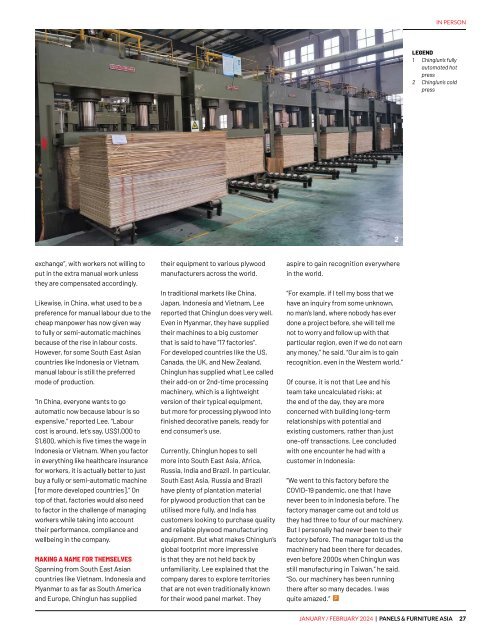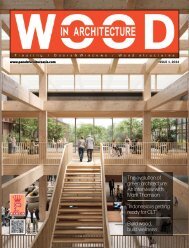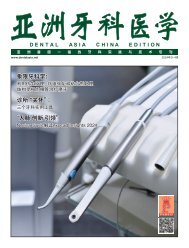Panels & Furniture Asia January/February 2024
Panels & Furniture Asia (PFA) is a leading regional trade magazine dedicated to the woodbased panel, furniture and flooring processing industry. Published bi-monthly since 2000, PFA delivers authentic journalism to cover the latest news, technology, machinery, projects, products and trade events throughout the sector. With a hardcopy and digital readership comprising manufacturers, designers and specifiers, among others, PFA is the platform of choice for connecting brands across the global woodworking landscape.
Panels & Furniture Asia (PFA) is a leading regional trade magazine dedicated to the woodbased panel, furniture and flooring processing industry. Published bi-monthly since 2000, PFA delivers authentic journalism to cover the latest news, technology, machinery, projects, products and trade events throughout the sector. With a hardcopy and digital readership comprising manufacturers, designers and specifiers, among others, PFA is the platform of choice for connecting brands across the global woodworking landscape.
You also want an ePaper? Increase the reach of your titles
YUMPU automatically turns print PDFs into web optimized ePapers that Google loves.
IN PERSON<br />
LEGEND<br />
1 Chinglun’s fully<br />
automated hot<br />
press<br />
2 Chinglun’s cold<br />
press<br />
2<br />
exchange”, with workers not willing to<br />
put in the extra manual work unless<br />
they are compensated accordingly.<br />
Likewise, in China, what used to be a<br />
preference for manual labour due to the<br />
cheap manpower has now given way<br />
to fully or semi-automatic machines<br />
because of the rise in labour costs.<br />
However, for some South East <strong>Asia</strong>n<br />
countries like Indonesia or Vietnam,<br />
manual labour is still the preferred<br />
mode of production.<br />
“In China, everyone wants to go<br />
automatic now because labour is so<br />
expensive,” reported Lee. “Labour<br />
cost is around, let’s say, US$1,000 to<br />
$1,600, which is five times the wage in<br />
Indonesia or Vietnam. When you factor<br />
in everything like healthcare insurance<br />
for workers, it is actually better to just<br />
buy a fully or semi-automatic machine<br />
[for more developed countries].” On<br />
top of that, factories would also need<br />
to factor in the challenge of managing<br />
workers while taking into account<br />
their performance, compliance and<br />
wellbeing in the company.<br />
MAKING A NAME FOR THEMSELVES<br />
Spanning from South East <strong>Asia</strong>n<br />
countries like Vietnam, Indonesia and<br />
Myanmar to as far as South America<br />
and Europe, Chinglun has supplied<br />
their equipment to various plywood<br />
manufacturers across the world.<br />
In traditional markets like China,<br />
Japan, Indonesia and Vietnam, Lee<br />
reported that Chinglun does very well.<br />
Even in Myanmar, they have supplied<br />
their machines to a big customer<br />
that is said to have “17 factories”.<br />
For developed countries like the US,<br />
Canada, the UK, and New Zealand,<br />
Chinglun has supplied what Lee called<br />
their add-on or 2nd-time processing<br />
machinery, which is a lightweight<br />
version of their typical equipment,<br />
but more for processing plywood into<br />
finished decorative panels, ready for<br />
end consumer’s use.<br />
Currently, Chinglun hopes to sell<br />
more into South East <strong>Asia</strong>, Africa,<br />
Russia, India and Brazil. In particular,<br />
South East <strong>Asia</strong>, Russia and Brazil<br />
have plenty of plantation material<br />
for plywood production that can be<br />
utilised more fully, and India has<br />
customers looking to purchase quality<br />
and reliable plywood manufacturing<br />
equipment. But what makes Chinglun’s<br />
global footprint more impressive<br />
is that they are not held back by<br />
unfamiliarity. Lee explained that the<br />
company dares to explore territories<br />
that are not even traditionally known<br />
for their wood panel market. They<br />
aspire to gain recognition everywhere<br />
in the world.<br />
“For example, if I tell my boss that we<br />
have an inquiry from some unknown,<br />
no man’s land, where nobody has ever<br />
done a project before, she will tell me<br />
not to worry and follow up with that<br />
particular region, even if we do not earn<br />
any money,” he said. “Our aim is to gain<br />
recognition, even in the Western world.”<br />
Of course, it is not that Lee and his<br />
team take uncalculated risks; at<br />
the end of the day, they are more<br />
concerned with building long-term<br />
relationships with potential and<br />
existing customers, rather than just<br />
one-off transactions. Lee concluded<br />
with one encounter he had with a<br />
customer in Indonesia:<br />
“We went to this factory before the<br />
COVID-19 pandemic, one that I have<br />
never been to in Indonesia before. The<br />
factory manager came out and told us<br />
they had three to four of our machinery.<br />
But I personally had never been to their<br />
factory before. The manager told us the<br />
machinery had been there for decades,<br />
even before 2000s when Chinglun was<br />
still manufacturing in Taiwan,” he said.<br />
“So, our machinery has been running<br />
there after so many decades. I was<br />
quite amazed.” P<br />
JANUARY / FEBRUARY <strong>2024</strong> | PANELS & FURNITURE ASIA 27


















